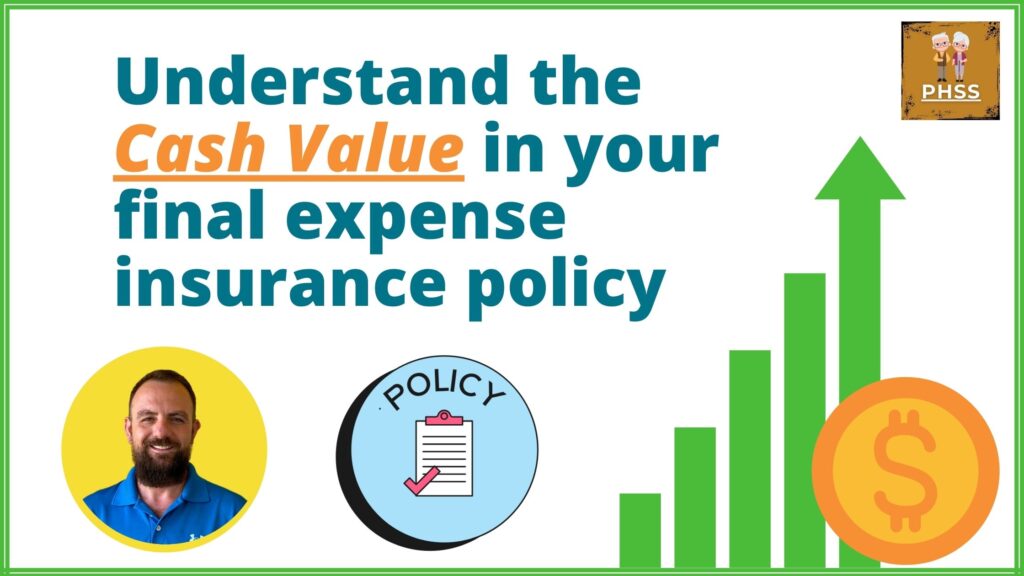Understand the Cash Value in Your Final Expense Insurance Policy

When it comes to planning for the future, particularly in the Tampa Bay Area, preparing for the unexpected is essential. One way to do this is by securing a final expense insurance policy. This type of insurance offers peace of mind and financial support to your loved ones after you’re gone. But, there’s more to it than just the death benefit.
Understanding the cash value in your final expense insurance policy is equally important. In this article “Understand the Cash Value in Your Final Expense Insurance Policy“, we’ll explore what cash value is, how it grows, how you can access it, and the potential consequences of doing so.
It is my intention to answer most of your questions in this article, but if I miss something please email me at daniel@pascohernandoseniorservices.org and I will answer your question.
What is Cash Value?
Cash value, often referred to as the cash surrender value, is one of the key components of a final expense insurance policy. It represents the amount of money that builds up over time as you pay your premiums. Think of it as a savings account within your policy, accumulating funds that you can access under certain conditions.
How Does Cash Value Grow?
The growth of cash value in your final expense insurance policy is typically a slow and steady process. Here’s how it typically works:
Premium Payments: When you make premium payments on your final expense insurance policy, a portion of that payment goes toward the policy’s cash value. The rest goes toward covering the cost of the insurance and administrative fees.
Interest: Your insurance company may also add interest to your cash value. The interest rate is predetermined by your insurer and can vary between policies and insurance companies. In many cases, it’s a conservative rate, ensuring slow but steady growth.
Time: Patience is key when it comes to cash value growth. The longer you hold your policy and consistently make premium payments, the more your cash value will accumulate.
Dividends (for participating policies): Some final expense insurance policies, known as participating policies, may pay dividends to policyholders. These dividends can be added to your cash value, providing additional growth.
Accessing Your Cash Value
Now that you understand how cash value grows, you might be wondering how you can access it. Here are some common ways to tap into your cash value:
Partial Withdrawals: You can make partial withdrawals from your cash value to cover unexpected expenses or supplement your income during your lifetime. Keep in mind that withdrawing too much may reduce the death benefit and could have tax consequences.
Policy Loans: Another option is taking out a policy loan. This allows you to borrow against your cash value while keeping your policy in force. It’s important to note that policy loans accrue interest, and if not repaid, they can reduce the death benefit and cash value.
Surrendering the Policy: If you no longer need the coverage or want to cash out your policy entirely, you can surrender it. This means canceling the policy and receiving the cash value, minus any surrender fees or outstanding loans. Surrendering your policy should be carefully considered, as it can have tax implications and leave your loved ones without the intended death benefit.
Consequences of Accessing Cash Value
Before accessing your cash value, it’s crucial to understand the potential consequences:
Reduced Death Benefit: Any withdrawal or loan against your cash value will reduce the death benefit payable to your beneficiaries. Make sure to weigh the pros and cons before making withdrawals or taking out loans.
Tax Implications: Depending on the amount and method of withdrawal, you may face tax consequences. It’s advisable to consult a tax professional or financial advisor to understand the tax implications specific to your situation.
Loss of Coverage: Surrendering your policy means you’ll lose the insurance coverage it provided. If your circumstances change and you later need life insurance, obtaining a new policy may be more expensive or even impossible due to changes in your health.
Other Important Aspects to Consider
While cash value is a crucial aspect of final expense insurance policies, there are other important factors to keep in mind:
Premium Payments: Consistently paying your premiums is essential to maintain your policy and continue building cash value. Missing payments can result in the policy lapsing, and you may lose both the death benefit and cash value.
Beneficiary Designation: Ensure that you have designated a beneficiary for your policy. This person or entity will receive the death benefit when you pass away.
Policy Type: Final expense insurance policies come in various forms, including whole life and simplified issue policies. Each type has its own features, premiums, and cash value growth potential, so choose the one that best suits your needs.
Conclusion
Understanding the cash value in your final expense insurance policy is crucial for making informed decisions about your financial future if you live in Pasco, Pinellas, Hernando, Hillsborough or Citrus, or any other location. It’s a valuable resource that can provide financial security during your lifetime, but it should be accessed with caution to avoid unintended consequences. Always consult with a financial advisor or insurance expert when considering changes to your policy or accessing your cash value.
If you don’t feel comfortable doing all of that yourself, we are here to help you figure everything out. You can call me directly @727-777-3608, that’s my cell number or give my office a call @727-261-6535
If you have questions about Final Expense Policies, don’t hesitate to contact one of our local agents who work in your community. Visit PascoHernandoSeniorServices.org to schedule an appointment.
It is my intention to answer most of your questions in this article, but if I miss something please email me at daniel@pascohernandoseniorservices.org and I will answer your question.


